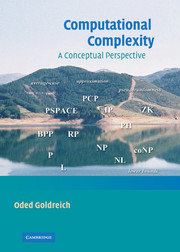Book contents
- Frontmatter
- Contents
- List of Figures
- Preface
- Organization and Chapter Summaries
- Acknowledgments
- 1 Introduction and Preliminaries
- 2 P, NP, and NP-Completeness
- 3 Variations on P and NP
- 4 More Resources, More Power?
- 5 Space Complexity
- 6 Randomness and Counting
- 7 The Bright Side of Hardness
- 8 Pseudorandom Generators
- 9 Probabilistic Proof Systems
- 10 Relaxing the Requirements
- Epilogue
- Appendix A Glossary of Complexity Classes
- Appendix B On the Quest for Lower Bounds
- Appendix C On the Foundations of Modern Cryptography
- Appendix D Probabilistic Preliminaries and Advanced Topics in Randomization
- Appendix E Explicit Constructions
- Appendix F Some Omitted Proofs
- Appendix G Some Computational Problems
- Bibliography
- Index
Appendix B - On the Quest for Lower Bounds
Published online by Cambridge University Press: 05 June 2012
- Frontmatter
- Contents
- List of Figures
- Preface
- Organization and Chapter Summaries
- Acknowledgments
- 1 Introduction and Preliminaries
- 2 P, NP, and NP-Completeness
- 3 Variations on P and NP
- 4 More Resources, More Power?
- 5 Space Complexity
- 6 Randomness and Counting
- 7 The Bright Side of Hardness
- 8 Pseudorandom Generators
- 9 Probabilistic Proof Systems
- 10 Relaxing the Requirements
- Epilogue
- Appendix A Glossary of Complexity Classes
- Appendix B On the Quest for Lower Bounds
- Appendix C On the Foundations of Modern Cryptography
- Appendix D Probabilistic Preliminaries and Advanced Topics in Randomization
- Appendix E Explicit Constructions
- Appendix F Some Omitted Proofs
- Appendix G Some Computational Problems
- Bibliography
- Index
Summary
Alas, Philosophy, Medicine, Law, and unfortunately also Theology, have I studied in detail, and still remained a fool, not a bit wiser than before. Magister and even Doctor am I called, and for a decade am I sick and tired of pulling my pupils by the nose and understanding that we can know nothing.
J. W. Goethe, Faust, lines 354–64Summary: This appendix briefly surveys some attempts at proving lower bounds on the complexity of natural computational problems. In the first part, devoted to circuit complexity, we describe lower bounds on the size of (restricted) circuits that solve natural computational problems. This can be viewed as a program whose long-term goal is proving that P ≠ NP. In the second part, devoted to proof complexity, we describe lower bounds on the length of (restricted) propositional proofs of natural tautologies. This can be viewed as a program whose long-term goal is proving that NP ≠ coNP.
We comment that while the activity in these areas is aimed toward developing proof techniques that may be applied to the resolution of the “big problems” (such as P versus NP), the current achievements (though very impressive) seem very far from reaching this goal. Current crown-jewel achievements in these areas take the form of tight (or strong) lower bounds on the complexity of computing (resp., proving) “relatively simple” functions (resp., claims) in restricted models of computation (resp., proof systems).
- Type
- Chapter
- Information
- Computational ComplexityA Conceptual Perspective, pp. 469 - 481Publisher: Cambridge University PressPrint publication year: 2008



